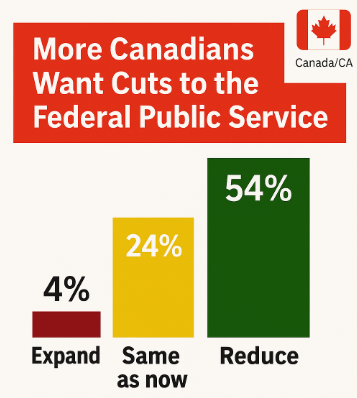Physical Address
304 North Cardinal St.
Dorchester Center, MA 02124
Physical Address
304 North Cardinal St.
Dorchester Center, MA 02124

August, 2025 – Ottawa, Canada – A recent Leger poll commissioned by the Canadian Taxpayers Federation reveals that a majority of Canadians believe the federal public service has grown too large and costly. According to the findings, 54% of Canadians want to see the size and cost of the federal public service reduced.
The survey, conducted earlier this month, asked Canadians whether they thought the public service should be bigger, smaller, or remain the same size. While just 4% supported expanding it, 24% felt it should stay the same, and 17% were unsure.
This sentiment comes amid growing public concern over rising government spending and the increasing costs associated with maintaining a large federal workforce. In recent years, the number of federal public servants has reached record highs, leading to debates over whether the growth is justified given the country’s fiscal challenges.
Critics argue that a bloated public service increases the tax burden on Canadians while not necessarily improving the efficiency or quality of government services. They also highlight that economic uncertainty, high inflation, and mounting federal debt make it imperative for Ottawa to streamline operations.
The Canadian Taxpayers Federation (CTF), which advocates for lower taxes and reduced government waste, says the poll results should be a wake-up call for federal leaders.
“Canadians are clearly saying they want Ottawa to spend smarter, not bigger,” said a CTF spokesperson. “It’s time for the federal government to take a serious look at where taxpayer dollars are going and whether every position is truly necessary.”
While most Canadians support downsizing, some argue that a strong public service is essential to deliver critical programs, especially in areas like healthcare, infrastructure, and climate change. Supporters of maintaining or growing the public service say that underfunding and understaffing could hurt service delivery and slow progress on national priorities.
The poll results could influence upcoming political debates, especially as parties prepare for the next federal election. Calls for efficiency and fiscal responsibility may gain momentum, potentially shaping campaign promises and policy platforms.
The Leger poll surveyed Canadians nationwide and has a margin of error of ±2.5 percentage points, 19 times out of 20.